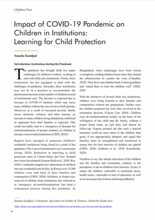childrens_living_arrangement
children_living_without_bio
Displaying 61 - 70 of 427
Join the Transforming Children’s Care Global Collaborative Platform Task Force on Family Reunification and Reintegration on a virtual panel on country examples of family reintegration in India, Uganda and Kenya.
Importance should be given to bringing up children in a family environment, Minister for Women and Child Development Veena George has said. She was speaking after virtually inaugurating a two-day national workshop on ‘Deinstitutionalisation and family-based alternative care’ organised by the Women and Child Development department in association with UNICEF here on Tuesday.
This document answers the most frequently asked questions surrounding family strengthening and alternative care in India while also addressing misconceptions around it. It aims to help practitioners, child protection workers and researchers to build their understanding of family strengthening and alternative care in India. This document has been developed in accordance with the Mission Vatsalya Guidelines.
Sri Lanka government officials visited the state of Rajasthan in India to view family-based care models that will inform Sri Lanka’s child protection system as the country transitions into an innovative approach that supports children in family settings. CERI, in partnership with UNICEF Sri Lanka and UNICEF India, hosted the delegation’s visit to family-strengthening, foster care, and group foster care models implemented by Foster Care Society and the Department of Child Rights in Rajasthan.
This report provides a summary of the learning exchange that took place around family-based care (family strengthening, foster care, specialized group care) in Udaipur, Rajasthan, India on August 24 - 28, 2022.
Why is it so important to consider mental health and emotional well-being in child care and child protection? How can we address mental health needs in a non-clinical environment?
A parliamentary standing committee has expressed serious concern over the decline in the number of children coming to adoption agencies over the years, saying it points to trafficking or a thriving illegal child adoption market.
Children First: Journal on Children's Lives is a bi-annual and peer-reviewed journal, launched by Delhi Commission for the Protection of Child Rights (DCPCR) with the aim of deepening and broadening the discourse on child rights by providing a platform to all persons who are engaged with
the rights of children in varied capacities to share their learnings, views and experiences in this context. This issue focuses on the continued impact on children in the Indian context in the second year of the pandemic and the disruptions caused in the children's lives. This is one of the articles in the latest issue.
India Alternative Care Network is pleased to invite you for the launch of 'Every Child's Right to Family Life: An Introduction to Family Strengthening and Alternative Care in India' on July 20.



